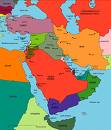"How America 'manages' Eurasia is critical. A power that dominates Eurasia would control two of the world's three most advanced and economically productive regions. A mere glance at the map also suggests that control over Eurasia would almost automatically entail Africa's subordination, rendering the Western Hemisphere and Oceania geopolitically peripheral to the world's central continent. About 75 per cent of the world's people live in Eurasia, and most of the world's physical wealth is there as well, both in its enterprises and underneath its soil. Eurasia accounts for about three-fourths of the world's known energy resources." (p.31)
***
Global ResearchJuly 1, 2014

The Obama Administration has been pursuing a policy of covert support for the Muslim Brotherhood and other insurgent movements in the Middle East since 2010. MEB has obtained a just-released U.S. State Department document through a Freedom of Information Act lawsuit that confirms the Obama Administration’s pro-active campaign for regime change throughout the Middle East and North Africa region.
The October 22, 2010 document, titled “Middle East Partnership Initiative: Overview,” spells out an elaborate structure of State Department programs aimed at directly building “civil society” organizations, particularly non-governmental organizations (NGOs), to alter the internal politics of the targeted countries in favor of U.S. foreign policy and national security objectives.
The five-page document, while using diplomatic language, makes clear that the goal is promoting and steering political change in the targeted countries:
“The Middle East Partnership Initiative (MEPI) is a regional program that empowers citizens in the Middle East and North Africa to develop more pluralistic, participatory, and prosperous societies. As the figures in this overview illustrate, MEPI has evolved from its origins in 2002 into a flexible, region-wide tool for direct support to indigenous civil society that mainstreams that support into the daily business of USG diplomacy in the region. MEPI engages all the countries of the NEA region except Iran. In the seven of NEA’s eighteen countries and territories with USAID missions, country-level discussions and communication between MEPI and USAID in Washington ensure that programming efforts are integrated and complementary.”
In a section of the document titled “How MEPI Works,” three core elements of the program were spelled out: region-wide and multi-country programming, local grants, and country-specific projects. The objectives of the region-wide and multi-country programming were described as:
“builds networks of reformers to learn from and support one another, and to catalyze progressive change in the region.” The local grants “provide direct support to indigenous civic groups, and now represent more than half of MEPI’s projects.”
Under the country-specific aspect of the program, designated officers of the U.S. embassies manage the funding and work as direct liaisons to the various funded local NGOs and other civil society groups. The “country-specific projects” are tasked “to respond to local developments and local needs, as identified by our embassies, local reformers, and our own field analysis. Political developments in a country may produce new opportunities or challenges for USG policy goals, and MEPI will shift funds to respond to these needs.”
According to the October 2010 document, the Deputy Chief of Mission (DCM) at every U.S. embassy in the MENA (Middle East/North Africa) is in charge of the MEPI program, giving it a clear high priority. The document makes clear that the Middle East Partnership Initiative is not coordinated with host governments:
“MEPI works primarily with civil society, through NGO implementers based in the United States and in the region. MEPI does not provide funds to foreign governments, and does not negotiate bilateral assistance agreements. As a regional program, MEPI can shift funds across countries and to new issue-areas as needed.”
The document makes clear that special priority, as early as 2010, was given to Yemen, Saudi Arabia, Tunisia, Egypt and Bahrain, and that project headquarters in Abu Dhabi and Tunis were overall coordinating centers for the entire regional program. Within a year of its inception, Libya and Syria were added to the list of countries on the priority list for civil society intervention.

No comments:
Post a Comment